We've gone Pink to help fight Breast Cancer.
Use code "BREAST" and we'll Donate $50 to National Breast Cancer Foundation
Main Menu
Petsy Breed Pages
The world’s most comprehensive information on the ...
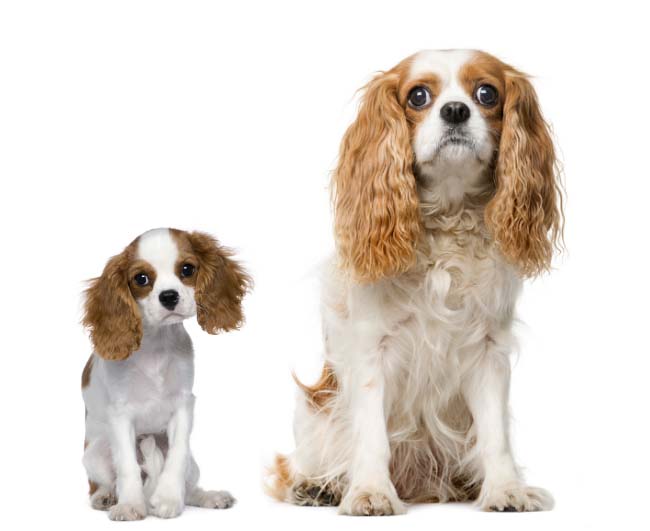
$1500.00 - $2500.00
English Toy Spaniel Toy Spaniel Charlies Prince Charles Spaniel Ruby Spaniel Blenheim Spaniel
Small
Toy Group
Medium
Medium
Medium
9 to 14 years

Would you like to know what it would cost to insure an Cavalier King Charles Spaniel? Find out by getting a free quote, with petsy pet insurance.





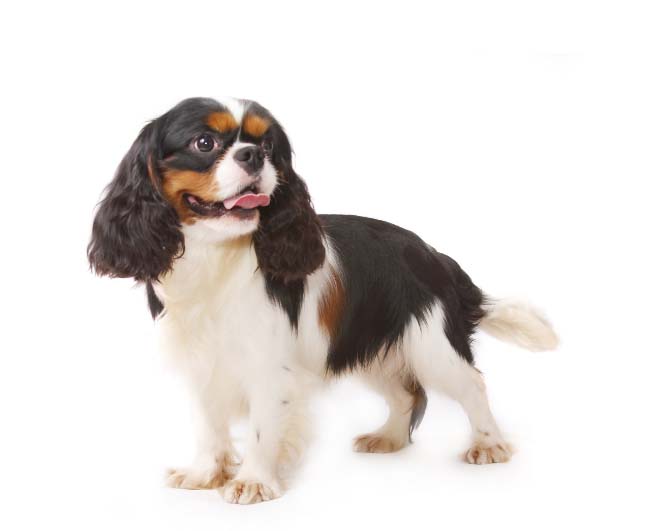


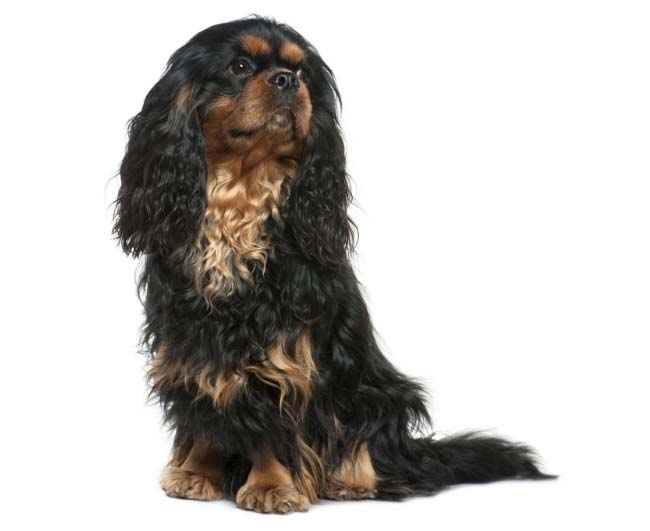
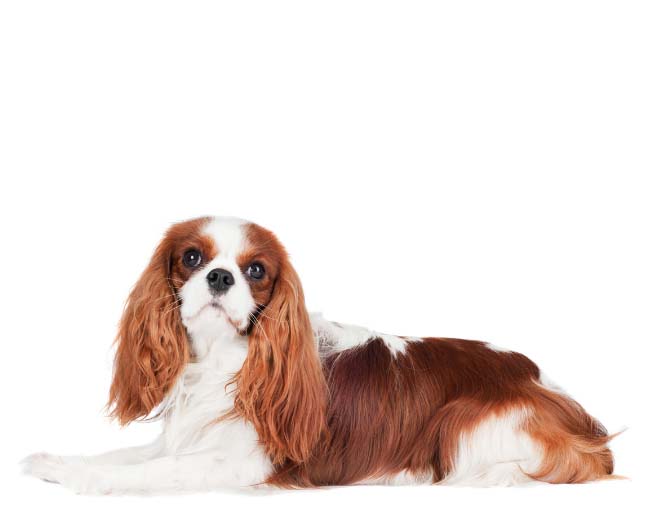
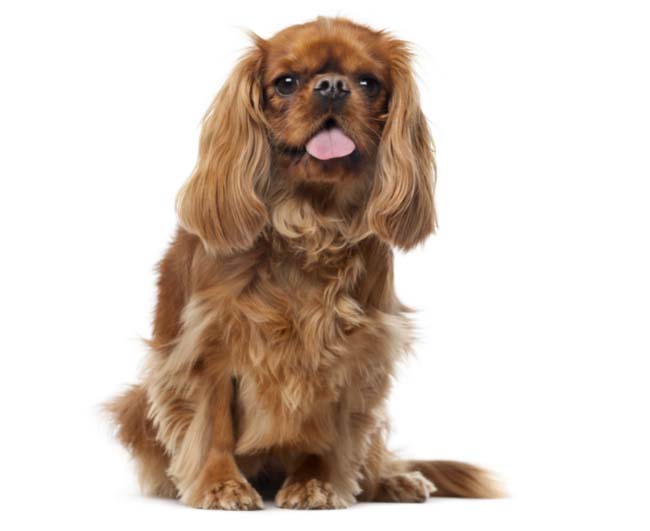
Cavalier King Charles Spaniel come in a variety of colours, including White and Gold, Tricolour, Black and Tan, Blenheim, Ruby.


How much do
Cavalier King Charles Spaniel eat?
1.00 to 1.50 cups of food a day

How much
exercise do they need?
20 to 40 Mins

Are they kid friendly? They can do very well with children

Do they need a lot of space? They're a relatively low maintenance dog ? at least in terms of exercise and space. They are one of the larger sized toy breeds but these regal dogs don't take up a lot of space.
Patellar Luxation
Legg-Perthes Disease
Hip Dysplasia
Heart murmurs
The Cavalier should be fed a high-quality dog food appropriate to the dog?s age (puppy, adult, or senior). Some Cavaliers are prone to getting overweight, so watch your dog?s calorie consumption and weight level. If you choose to give your dog treats, do so in moderation.
Treats can be an important aid in training, but giving too many can cause obesity. Give table scraps sparingly, if at all, especially avoiding cooked bones and foods with high fat content. Learn about which human foods are safe for dogs, and which are not. Check with your vet if you have any concerns about your dog?s weight or diet.
Shedding level for Cavaliers is average due to their beautiful, silky coat, and they tend to shed most in the spring and fall months. Regular brushing two or three times a week can remove dead hairs, so they don?t collect on your floor, furniture, and clothing. However, if having any amount of dog hair in the house bothers you, this breed may not be for you since they are definitely house dog.
Cavaliers are fairly easy to groom and maintain. Aside from regular brushing 3 or 4 times a week, they will also need bathing every 2 weeks or as necessary. Be sure to brush carefully around their ears and behind their legs, as this is generally where tangles and mats form because of the feathering. Although some owners like to take this breed to get their feathering trimmed, it is also perfectly fine to let it grow out and take form naturally.
Check your Cavalier?s ears regularly and wipe them out with a cotton ball to prevent any build-up. Trim their nails if they don?t wear them down themselves. And get into the habit of checking him each time you groom for sores, rashes, tender spots, infections, etc. It?s best to catch these things early before they become too serious.
Although the Cavalier was bred to be a beloved lap dog, this breed descends from sporting dogs and does enjoy moderate exercise and outdoor activities. He will happily go on walks with his owner and also performs well in a number of canine sports, but he?s just as glad to stay on the sofa all day. Cavaliers should not be allowed off leash because they retain scenting and hunting instincts, and they may not come when called if they?ve found an interesting trail to follow or a creature to pursue. A fenced yard is recommended.
Your Cavalier will enjoy a daily walk or romp in the yard and will tailor his activity level to your own. They will adapt to whatever amount of exercise you feel able to give but do need some regular exercise or they will put on the pounds.
Veterinary care is essential to a dog?s health and wellbeing, however the frequency of treatment and checkups will depend on the dog.
Scheduled six-monthly health check visits with your vet are important to ensure your Cavalier is healthy and happy throughout all life stages. In these annual visits, your vet will complete a physical examination, take your dog?s temperature and check his heartbeat, among other things. Routine maintenance for your dog gives you a chance to track your dog?s growth and development and discuss any concerns with your vet, and forms a key part of preventative care.
Cavaliers are an ideal family dog because they are so versatile. They love sitting on your lap for hours, but are always willing to jump up and play with anyone who?s ready for some fun. They do especially well with older children, but will need supervision with toddlers to be sure both the dog and child play nicely. Keep in mind that Cavaliers don?t like to be left alone for long hours, so be sure that someone is always in the house to keep them company.
Cavaliers are extremely loving, especially to their owners who they will grow a strong attachment to, but also to any and all strangers! They generally have a calm nature which makes them a good choice for apartment living. They love the opportunity to cuddle on your lap but are also always up for a good adventure. They are smart and athletic and especially good at bird flushing.
They have large, dark puppy-dog eyes, and they definitely know how to work them to get what they want, so be careful not to spoil them too much. They will likely follow you all around the house and don?t do well if left alone, so make sure there is always someone there to keep them company.
Training the Cavalier King Charles Spaniels is not troublesome. They respond well to mild obedience training, but for best results they need a dominant and obvious pack leader.
When it comes to training, Cavaliers are generally intelligent and willing to try whatever it is you'd like them to do. Food rewards and positive reinforcement help ensure that training goes smoothly. Cavaliers have a soft personality, so yelling at them is counterproductive and likely to send these sweeties into the sulks or into hiding. Instead, reward them every time you see them doing something you like, whether it's chewing on a toy instead of your Prada pumps or not barking in response when the dog next door barks. They'll fall all over themselves to find more things that you like.
They are smart and train easily, and Cavaliers excel in a number of canine sports including obedience, rally, and agility.
Cavaliers are known to play well with cats, especially if the cat doesn?t mind a little bit of rough play.
However, Cavaliers tend to have a strong prey instinct and should not be left alone with cats or other pets, particularly without supervision. Make sure you begin socialising your Cavalier and cat from a young age to be sure both learn to play nicely. Their ability to bond with larger and smaller dogs makes them ideal in houses with more than one breed of dog as long as the other dog is trained.
Overall, they are quite tolerant of other pets in the home.
Here are some of the breeders who we work with as part of our breeder awareness program.
They are invested in ensuring the longevity of the breed and that new owner become responsible Affenpinchers owners.
Affenpinchers who are friends of Petsy





Enter your email in the form below and we will send you the full report as a pdf directly to your inbox.
Don’t worry, we hate spam too – read our privacy policy
Find the right level of insurance for your needs our customised quote takes less than a few minutes to complete.
The Cavalier should be fed a high-quality dog food appropriate to the dog?s age (puppy, adult, or senior). Some Cavaliers are prone to getting overweight, so watch your dog?s calorie consumption and weight level. If you choose to give your dog treats, do so in moderation.
Treats can be an important aid in training, but giving too many can cause obesity. Give table scraps sparingly, if at all, especially avoiding cooked bones and foods with high fat content. Learn about which human foods are safe for dogs, and which are not. Check with your vet if you have any concerns about your dog?s weight or diet.
Although the Cavalier was bred to be a beloved lap dog, this breed descends from sporting dogs and does enjoy moderate exercise and outdoor activities. He will happily go on walks with his owner and also performs well in a number of canine sports, but he?s just as glad to stay on the sofa all day. Cavaliers should not be allowed off leash because they retain scenting and hunting instincts, and they may not come when called if they?ve found an interesting trail to follow or a creature to pursue. A fenced yard is recommended.
Your Cavalier will enjoy a daily walk or romp in the yard and will tailor his activity level to your own. They will adapt to whatever amount of exercise you feel able to give but do need some regular exercise or they will put on the pounds.
Cavaliers are an ideal family dog because they are so versatile. They love sitting on your lap for hours, but are always willing to jump up and play with anyone who?s ready for some fun. They do especially well with older children, but will need supervision with toddlers to be sure both the dog and child play nicely. Keep in mind that Cavaliers don?t like to be left alone for long hours, so be sure that someone is always in the house to keep them company.
Cavaliers are extremely loving, especially to their owners who they will grow a strong attachment to, but also to any and all strangers! They generally have a calm nature which makes them a good choice for apartment living. They love the opportunity to cuddle on your lap but are also always up for a good adventure. They are smart and athletic and especially good at bird flushing.
They have large, dark puppy-dog eyes, and they definitely know how to work them to get what they want, so be careful not to spoil them too much. They will likely follow you all around the house and don?t do well if left alone, so make sure there is always someone there to keep them company.
Cavaliers are known to play well with cats, especially if the cat doesn?t mind a little bit of rough play.
However, Cavaliers tend to have a strong prey instinct and should not be left alone with cats or other pets, particularly without supervision. Make sure you begin socialising your Cavalier and cat from a young age to be sure both learn to play nicely. Their ability to bond with larger and smaller dogs makes them ideal in houses with more than one breed of dog as long as the other dog is trained.
Overall, they are quite tolerant of other pets in the home.
Suite 58, Mezzanine/388 George St, Sydney NSW 2000
Petsy Pty Ltd (ABN 54 633 343 058, AR 1277359) (‘Petsy’) distributes and promotes Petsy Pet Protection Plus (formally Petsy Pet Insurance), Petsy Puppy Protection Plus and Petsy Kitten Protection Plus as an authorised representative of Knose Financial Services Pty Ltd (ABN 38 620 795 735, AFSL 536651) trading as ThePetInsuranceCompany.com.au (‘ThePetInsuranceCompany.com.au’). ThePetInsuranceCompany.com.au is an underwriting agency acting under a binding authority as an agent for the insurer; Pacific International Insurance Pty Limited (ABN 83 169 311 193) (‘Pacific) in relation to Petsy Puppy Protection Plus and Petsy Kitten Protection Plus policies and Petsy Pet Protection Plus policies from 01 March 2023 or have an anniversary renewal date from 18 March 2023, and the Australia branch of Allied World Assurance Company, Ltd (ABN 54 163 304 907) (‘Allied World’) in relation to Petsy Pet Insurance policies purchased between 17 February 2022 and 28 February 2023 (inclusive) or renewed between 01 March 2023 and 17 March 2023 (inclusive). In all aspects of arranging this product, Petsy and ThePetInsuranceCompany.com.au act as an agent of Pacific/Allied World (as the case may be) and not as your agent. Any advice contained in this email is general advice only and has been prepared without taking into account individual objectives, financial situation or needs and you should consider the appropriateness of any such advice, the Product Disclosure Statement (‘PDS’) and the Target Market Determination (‘TMD’) available via http://www.petsy.com.au or by calling 1300 952 790 before making a decision to acquire, or to continue to hold, the product. Terms, conditions, limits and exclusions apply. Please refer to the PDS.
© Copyright 2024 Petsy Pet Insurance
During the application process You will be provided with the option to include Optional Extra Benefits that cover certain conditions and Treatments which are not otherwise covered under the Policy.
The Optional Extra Benefits are:
Alternative Therapies, Behavioural Problems, and Dental Illness.
Examples of Alternative Therapies: Acupuncture, physiotherapy, hydrotherapy
Examples of Behavioural Problems: Excessive licking, fur pulling, pacing and destructive
chewing.
Examples of Dental Illnesses: Dental diseases, gingivitis, periodontal disease.